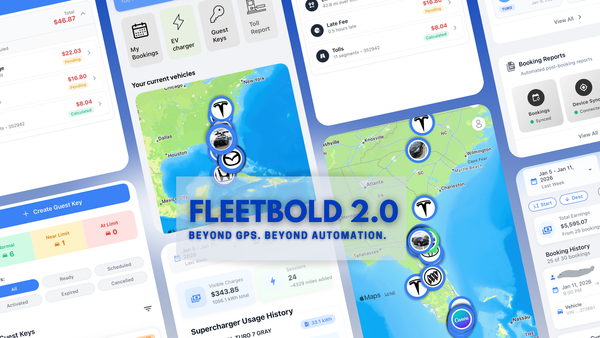Turo: A Profitable Opportunity, If You Do It Right
Turo offers car owners the chance to earn income by renting out their vehicles. However, success requires strategic planning, pricing, and excellent customer service. This guide covers key steps to maximize your Turo profits, avoid common mistakes, and grow your business.

Introduction: Turo as a Profitable Business Opportunity
In the past few years, Turo has revolutionized the way people think about car rentals. The platform allows anyone with a vehicle to turn it into a revenue-generating asset, offering the ability to rent out their cars directly to customers. With its innovative business model, Turo has disrupted the traditional car rental industry, offering flexibility and a fresh way for individuals to earn money.
The idea is simple: list your car on Turo and earn money when it’s rented. However, while this might seem like an easy way to make passive income, the reality is that, like any business, success on Turo requires planning, strategy, and good decision-making. For every successful Turo host, there are others who struggle to generate a profit or even give up after a few months. So, what differentiates the successful hosts from those who falter?
In this blog post, we’ll go into the detailed strategies you need to implement to maximize your Turo profits, avoid common pitfalls, and maintain a steady and growing business. If you’re thinking about using Turo as a business model or are already hosting, this guide will provide you with the insights you need to take your car rental business to the next level.
Turo is a Tool—Success Depends on How You Use It
Understanding the Power of Turo
At its core, Turo is a powerful tool. It’s not just about listing your car and waiting for someone to rent it. Success on Turo involves making informed decisions, strategic planning, and continuous effort to improve your listing. Here are some key advantages Turo provides that can help make your venture a success:
- Accessibility: You don’t need to invest in an entire fleet of cars. One well-maintained vehicle can generate consistent revenue.
- Flexibility: You have full control over when and how often you rent your car. Whether you want to rent it out on weekends or every day, the choice is yours.
- Earning Potential: Depending on the car type, location, and pricing strategy, a single vehicle can generate significant income.
However, the success of your Turo business ultimately comes down to how you leverage the platform. Without proper understanding and preparation, many people end up underperforming. Success isn’t guaranteed just by listing a car—it takes strategy, market understanding, and financial planning.
The Key to Success: Strategic Planning and Execution
The difference between thriving Turo hosts and those who fail usually comes down to one key factor: strategy. Without a clear business plan, it’s easy to get caught up in the excitement of the platform but fail to achieve long-term success.
Choosing the Right Car for Your Turo Business
The first step in your Turo journey is selecting the right car. Not all vehicles are created equal when it comes to car-sharing platforms. To maximize profitability, you need to choose a car that matches the demand in your area, caters to travelers' preferences, and is profitable in the long run.
Popular Car Categories on Turo
Certain car types perform better than others on Turo. Based on demand and market trends, here are some popular vehicle categories:
- SUVs: These vehicles are in high demand, particularly for families, road trips, or groups of travelers. People prefer large vehicles when traveling with luggage or a group of friends.
- Electric Vehicles (EVs): With growing interest in eco-friendly travel, electric vehicles are an increasingly popular choice for renters who want a green option or those interested in trying out the latest EV technology. EVs are an ideal rental choice for urban travelers who may not own an electric car themselves.
- Budget-Friendly Vehicles: Cars like compact sedans and economy cars are excellent choices for travelers looking to save on rental fees. These vehicles are often the go-to options for budget-conscious guests who need a practical car for short-term trips.
Before purchasing a new car to list on Turo, it’s important to test the market with the vehicle you already own. This minimizes financial risk and helps you gain an understanding of the demand in your area. Using your current vehicle allows you to experiment with the platform without the commitment of a new purchase.
Pricing Strategy: Maximizing Your Earnings on Turo
Pricing is crucial to your success on Turo. Setting the right rental price can mean the difference between a busy rental schedule and low bookings. However, pricing isn’t a simple task. Several factors need to be considered when determining how much to charge for your vehicle.
Market Research
Start by researching the prices of similar vehicles in your area. Check out the competition—other Turo listings—and find out what similar cars are being rented for. Aim to position your car at a competitive price while still covering your expenses and generating a profit.
Turo’s Earnings Calculator
Turo’s Earnings Calculator is a powerful tool that helps you estimate how much you can make based on your car type, location, and pricing. Use this tool to project profits, but be sure to account for the platform’s fees, maintenance, and insurance costs.
Dynamic Pricing
Many Turo hosts use dynamic pricing, which adjusts your rental rates based on demand, time of year, and local events. However, dynamic pricing can sometimes increase your costs and make your rates seem uncompetitive. As such, manual pricing adjustments are often a more effective way to maintain control over your rental rates.
Offering a Premium Experience: Going Above and Beyond
What sets successful hosts apart from the rest is the customer experience. Offering a premium experience doesn’t just mean having a clean car—it means going above and beyond to ensure that your guests have a seamless, enjoyable experience.
Value-Added Extras
Providing additional items can make your car more attractive to potential renters. Consider offering:
- Child car seats, which are often a necessity for families traveling with young children.
- Wi-Fi for business travelers who need to stay connected while on the road.
- Airport delivery for travelers flying into your city, providing a convenience that can boost your reviews and attract more bookings.
Customer Service
Excellent customer service is key to building a reputation on Turo. Make sure you’re responsive to guests' questions, provide timely support, and ensure smooth pick-up and drop-off processes. The better your service, the more likely you are to receive positive reviews, which will help improve your visibility on the platform.
What If Things Aren’t Going as Expected?
Even with the best planning, things might not always go according to plan. The market can change, demand can fluctuate, and unexpected costs can arise. But don’t worry—there are steps you can take to adjust and get back on track.
A. Low Bookings? Try These Fixes
If your bookings aren’t where you expected, take a look at these strategies:
- Optimize Your Pricing: Compare your rates to similar listings and adjust accordingly. You might find that a small price reduction attracts more renters.
- Enhance Your Listing: High-quality photos and a compelling description can make a huge difference. Be sure to highlight the best features of your car and its benefits to potential renters.
- Experiment with Locations: If bookings in your current area are low, consider expanding your listing to nearby cities or airports where demand may be higher.
B. High Insurance Costs?
If you’re finding that insurance costs are eating into your profits, consider the following:
- Explore Commercial Insurance Options: Some insurance providers offer policies tailored to Turo hosts, often at a lower cost than standard insurance.
- Adjust Coverage Levels: Review your insurance policy and adjust your coverage to match your business needs. This might help lower your premiums without sacrificing necessary protection.
C. Car Not Performing Profitably?
If your vehicle isn’t performing as well as expected, you have several options:
- Reevaluate Your Vehicle: Is your car truly the best model for your target market? It might be worth selling or trading it for something more profitable.
- Refinance Your Loan: If your car’s loan payments are too high, consider refinancing to lower your monthly payments, easing the financial pressure.
- Alternative Platforms: Explore other car rental platforms or consider renting to rideshare drivers like Uber or Lyft.
Conclusion: Turo as a Profitable Venture
Turo is a fantastic platform for generating income from your car, but success depends on how you approach it. By choosing the right vehicle, setting competitive pricing, offering excellent service, and being flexible enough to adjust to changes, you can transform your Turo business into a steady income source.
Like any entrepreneurial endeavor, success on Turo takes planning, smart decision-making, and adaptability. If you’re ready to take your Turo business to the next level, focus on crafting an exceptional experience for your customers and fine-tuning your strategies to maximize your earning potential.
If you would like to read more interesting blog content, visit our website at www.fleetbold.com.
Frequently Asked Questions (FAQ)
What are the best car types for Turo?
Popular car types include SUVs, electric vehicles (EVs), and budget-friendly models like compact cars. These vehicle types are in high demand and cater to a wide range of customers.
How do I maximize my profits on Turo?
To maximize profits, you should optimize your pricing, enhance your listing with high-quality photos, and offer value-added extras like child seats or Wi-Fi. Great customer service also leads to repeat bookings.
How do I calculate my earnings on Turo?
Use Turo’s Earnings Calculator to estimate potential profits. Be sure to account for expenses such as insurance, maintenance, and Turo’s platform fees when calculating your final earnings.
What should I do if bookings are low?
To increase bookings, try adjusting your pricing, improving your listing photos, or expanding your location to attract a wider audience.





